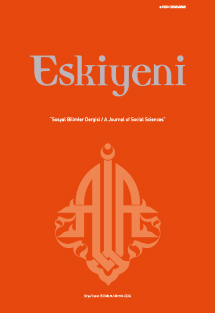Müellifi Bilinmeyen Manzum Bir İlmihâl: Şerâʼit-i İslâm
A Verse Catechism of Unknown Author: Sharāit al-Islām
Author(s): Mehmet Fatih UzunSubject(s): Language and Literature Studies, Law, Constitution, Jurisprudence, Islam studies, Turkic languages
Published by: Anadolu İlahiyat Akademisi
Keywords: Turkish Language; Old Turkey Turkish; Catechism; Sharāit al-Islām; Mathnawi;
Summary/Abstract: In this study, a poetic catechism from the Old Turkey Turkish period, Sharāit al-Islām, whose author is unknown, will be evaluated. With the beginning of the translation activities in the Old Turkey Turkish period, religious works were translated from Arabic and Persian into Turkish, or works were written directly in Turkish to teach religious subjects to the public. Among the works written in Turkish, catechism in verse which was written to teach basic religious knowledge and explain it the people, has an important place. Sharāit al-Islām is one of the works written in this period. Written in a didactic style in the verse form of mathnawi, it is written in a simple and easy to understand language. Sharāit al-Islām, in which the pillars of Islam are explained, consists of chapters on the word of shahada, prayer, fasting, zakat, and pilgrimage. In the work, the necessity of affirming the oneness of Allah by giving shahada, the importance of prayer, the virtue of fasting, the amount of zakat, who is obliged to perform hajj and what to do during hajj, etc., are explained in the style of advice and poetic language. The total number of couplets is 260. The author and date of composition of the work, of which three copies can be found in Istanbul Süleymaniye Library, Istanbul Metropolitan Municipality Atatürk Library and, Ankara National Library Adnan Ötüken Provincial Public Library, is unknown. In addition to showing Old Turkey Turkish characteristics in terms of language and orthography, the work also contains many words belonging to the vocabulary of this period. In the work, which is understood to have been written for the public, it is seen that Arabic and Persian words and phrases are used in addition to the phrases, idioms, and words used in the folk language. The work, which seems to have been written by a poet with a good command of Turkish, is essential in showing that religious works were written in Turkish during the Old Turkey Turkish period. In the article, information about the structure and content of the poetic catechism Sharāit al-Islām, is given and its copies are introduced. In addition, the critical text of the work is given and information about the language and spelling features and vocabulary is given.
Journal: Eskiyeni
- Issue Year: 2024
- Issue No: 52
- Page Range: 267-297
- Page Count: 31
- Language: Turkish

